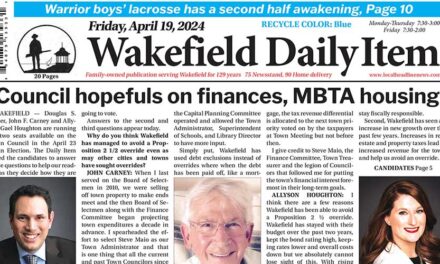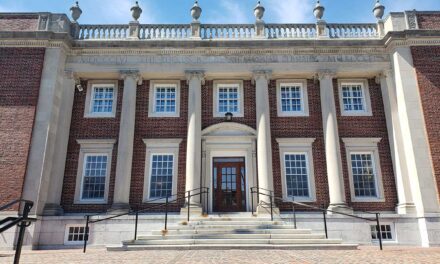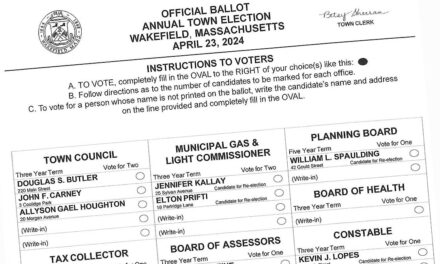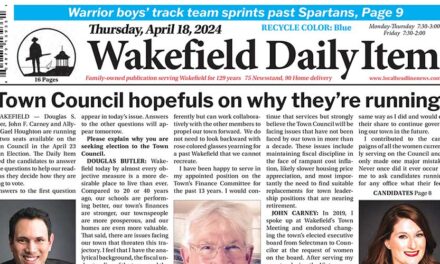By MARK SARDELLA
WAKEFIELD — Town Administrator Stephen P. Maio painted a bright fiscal picture for Wakefield, as he reviewed the town’s finances at last night’s meeting of the Board of Selectmen. Maio’s PowerPoint presentation looked back at Fiscal Year 2014 and ahead at the current FY 2015.
He began by going back to July 1, 2013, when the town had a state-certified $7,060,031 in its Free Cash account. Maio said that this allowed the November 2013 Town Meeting to put some of these funds to good use.
Town Meeting voted to put $250,000 into the Stabilization Fund and placed another $250,000 into the Debt Service Fund. Town Meeting allotted another $50,000 toward sidewalks and roadways, Maio said, and $110,000 was used to replace a boiler at the Greenwood School.
At the May 2014 Annual Town Meeting, voters authorized $740,000 for the extra pay period, Maio reminded the Board, and OK’d another $330,000 for a School Department Special Education Stabilization Fund.
Maio said that left the estimated Free Cash Balance at $5,250,000. Maio noted that “Free Cash” consists of money returned from town departments at the end of a fiscal year as well as revenue that exceeds projections.
Maio observed that all town departments returned money last year, with Group Insurance heading the list at $752,883 returned, reflecting continued savings from moving town employee insurance plans to the state Group Insurance Commission. Lesser amounts were returned from other departments for a grand total of $981,822.
In addition, Maio said that the town took in $6,442,554 from recurring sources in FY 2014, $1,080,054 more than the projected $5,362,500.
Maio said that, while not yet certified by the state, the town’s FY 2014 year-end Free Cash balance now stands unofficially at $8.5 million. The balance in the Stabilization Fund is $2.8 million, according to Maio.
He noted that several years ago the selectmen adopted a fiscal policy that held that the Stabilization Fund should be 3 percent of the overall budget, which would be $2.4 million.
The town’s Free Cash balance also exceeds by $2.5 million the 2-8 percent of operating budgets that the board’s fiscal policy set as the standard for Free Cash.
Maio anticipated the following expenditures coming from next month’s Regular Town Meeting:
- Police contracts – $150,000 (from tax levy)
- Fire Department contract – $150,000 (from tax levy)
- High School Feasibility Study – $150,000 (Free Cash)
- Core Network Computer Upgrade – $250,000 (Free Cash)
- Improvements to the Salem Street corridor traffic signalization – $125,000 (Free Cash)
- Forest Glade Cemetery expansion – $250,000
- To balance budget – $350,000 (Free Cash)
According to Maio, that would place the Free Cash balance at the end of the November Town Meeting at $7.5 million.
Maio proposed to the selectmen that in the near future they undertake an “enterprise risk assessment.” He said that it is a method that businesses use to determine their appetite for risk. He suggested running through some “stress tests” by thinking about what would happen if state aid were to plummet, the Affordable Care Act causes insurance costs to soar or New Growth dries up.
The results of the process, Maio said, would be a “risk appetite statement” established by the board.
Selectman Patrick Glynn praised Maio for his presentation. Glynn said that he would like to see the town continue to invest in infrastructure and look at tackling some of the Tier II projects established by the Capital planning Committee. Glynn said that he would also favor sharing some of the town’s fiscal success with the taxpayers in the form of property tax relief.
Selectman Betsy Sheeran said that she liked Maio’s idea of going after MassHighway for some funding for the Salem Street corridor signal improvements. She also advocated an overall aggressive pursuit of grant funding by the town. In addition, Sheeran suggested making sure that the town’s fee structure is keeping pace with the cost of providing services.
Selectman Paul DiNocco said that he agreed with the Salem Street improvements and also pointed to the downtown area as a possible area to focus on. Maio agreed that more needed to be done to maintain the town’s roadways, but noted that coordinating with scheduled utility work can be a complicating factor.
While board members lauded Maio for his handling of the town’s finances, Maio in turn credited the board’s policies and decisions for the town’s positive financial picture.




